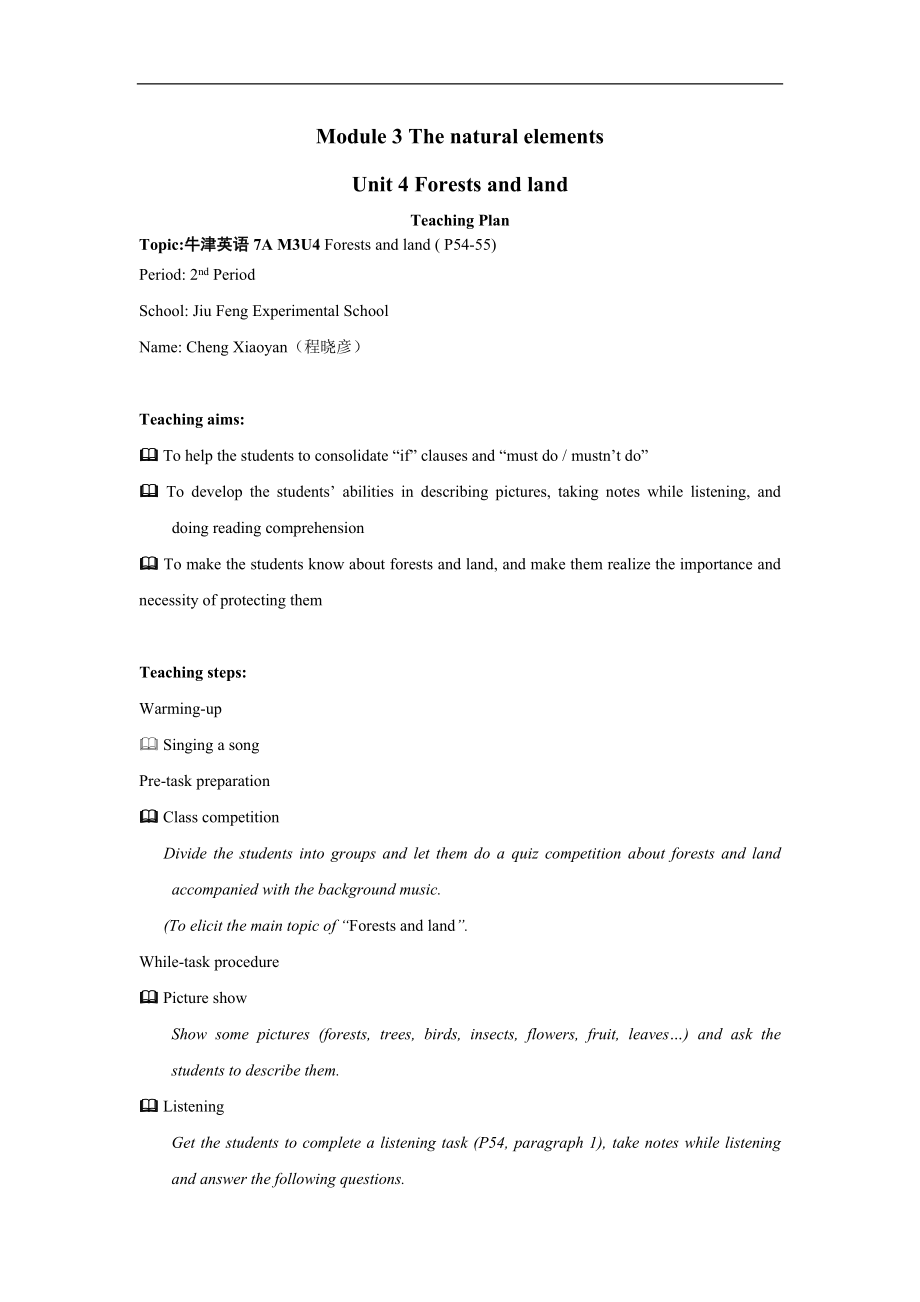《上海牛津英語七上Module 3 Unit 4 Forests and land Period 2教案》由會(huì)員分享����,可在線閱讀,更多相關(guān)《上海牛津英語七上Module 3 Unit 4 Forests and land Period 2教案(3頁珍藏版)》請?jiān)谘b配圖網(wǎng)上搜索��。
1����、
Module 3 The natural elements
Unit 4 Forests and land
Teaching Plan
Topic:牛津英語7A M3U4 Forests and land ( P54-55)
Period: 2nd Period
School: Jiu Feng Experimental School
Name: Cheng Xiaoyan(程曉彥)
Teaching aims:
& To help the students to consolidate “if” clauses and “must do / mustn’t do”
2、
& To develop the students’ abilities in describing pictures, taking notes while listening, and doing reading comprehension
& To make the students know about forests and land, and make them realize the importance and necessity of protecting them
Teaching steps:
Warming-up
& Singing a song
Pr
3��、e-task preparation
& Class competition
Divide the students into groups and let them do a quiz competition about forests and land accompanied with the background music.
(To elicit the main topic of “Forests and land”.
While-task procedure
& Picture show
Show some pictures (forests, tr
4�����、ees, birds, insects, flowers, fruit, leaves…) and ask the students to describe them.
& Listening
Get the students to complete a listening task (P54, paragraph 1), take notes while listening and answer the following questions.
Q:1.What is a forest?
2.Why are forests very important?
3.What d
5����、o birds do in trees?
4.What animals build homes in the hollows of the trees?
5.What is food for them?
Give the students 1 minute to join the five short answers into one paragraph. (Invite 1-2 students to say sth. about the paragraph.)
& Ask and answer
Get the students
6�����、to read the other two paragraphs silently, and do the pair work to ask and answer about the contents of the two paragraphs.
A: What do people use trees for? B:…
A: Where do oil and coal come from? B:…
A: What do we use land for? B:…
A: Why do many animals die?
7、 B:…
A: What must we stop doing? B:…
& Read aloud the whole text
& Fill in the blanks
Get the students to fill in the blanks with proper words according to the text. (This exercise can be found onP55 of the textbook)
Post-task activities
& Answer the question: If there are n
8���、o trees, what will happen?
Get the students to do pair work to practise the sentence patterns as the following. The students can refer to the pictures shown on the display board.
! S1:If there are no trees (Without trees), what will happen?
! S2:If there are no trees (Without trees), _____
9��、___________.
! S1:What may happen when there is a flood?
! S2: _______________________.
& Discuss the topic: How should we protect forests, land and the earth?
Get the students to work in groups to discuss how to protect forests, land and the earth. Use the sentence patterns: We must / mus
10���、tn’t do…to protect forests ( land, the earth).
& Summaries
Forests are very important to people, animals and insects.
We must stop cutting down the forests.
We must protect forests and land.
We are the friends of the earth.
Homework:
& Follow the tape and read the text fluently
& Write a p
11、assage around 60 words on the topic “ We are the friends of the Earth”
附:教學(xué)設(shè)計(jì)說明:
本節(jié)課是第二課時(shí)��,主要學(xué)習(xí)有關(guān)森林和土地的內(nèi)容���。在第一課時(shí)中����,我們已經(jīng)學(xué)習(xí)了有關(guān)的單詞和“if”句型�。因此本節(jié)課的教學(xué)目標(biāo)是讓學(xué)生鞏固“if”所引導(dǎo)的條件狀語從句,以及“must do/ mustn’t do”句型��,通過聽力和表述課文���,提高學(xué)生的聽說讀寫能力���。同時(shí)��,讓他們意識(shí)到森林和土地的重要性�,使他們明白大自然是我們的朋友�,我們有責(zé)任和義務(wù)去愛護(hù)它!
Warming-up中, 學(xué)生唱一首輕快的植樹英文歌來活躍課堂氣氛����。
Pr
12、e-task preparation中, 把學(xué)生分成兩組進(jìn)行一個(gè)簡單的關(guān)于森林和土地的知識(shí)競賽���,以此來引出本課主題�����。
進(jìn)入到While-task procedure, 作為新授課�,要去聽讀�����、理解課文內(nèi)容�。課文有三段�����,我把它們這樣處理:第一段做聽力,讓學(xué)生回答問題�,隨后讓他們把回答的問題串聯(lián)成一段話,即是課文的第一段內(nèi)容�;第二、三段讓學(xué)生默讀��,之后根據(jù)課文內(nèi)容進(jìn)行ask and answer����,同桌之間一問一答。這樣���,鍛煉了他們的聽力以及閱讀理解能力����,同時(shí)也培養(yǎng)了他們的合作能力�,使他們在短時(shí)間內(nèi)對課文有整體的了解。再根據(jù)課文填空�����,進(jìn)一步檢查他們對課文的熟悉程度�。
進(jìn)入到Post-task activities�����,一方面讓學(xué)生運(yùn)用所學(xué)過的“if”從句�,以及“must do/ mustn’t do”句型來拓展所學(xué)課文內(nèi)容�����;另一方面���,讓學(xué)生了解保護(hù)森林的重要性�����,以及激發(fā)他們熱愛大自然的情感����。
 上海牛津英語七上Module 3 Unit 4 Forests and land Period 2教案
上海牛津英語七上Module 3 Unit 4 Forests and land Period 2教案

